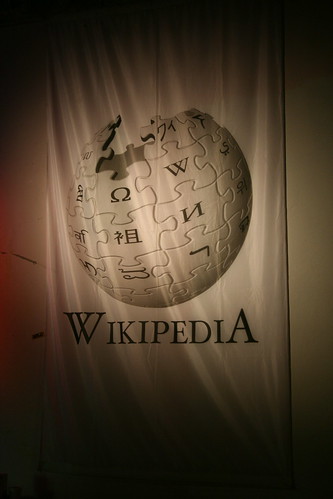Firstly, I completed marking student submissions for Business Information Management (LBSIS1036). This is a level one module which introduces web technologies to students; but it is also a module which introduces information literacy skills. These skills are tested in an in-lab assessment in which students can demonstrate their ability to critically evaluate information, ascertain provenance, IPR, etc. To assist them the students are introduced to evaluation methodologies in the sessions preceding the assessment which they can use to test the provenance of information sources found on the 'surface web'.
Students' performance in the assessment was patchy. Those students that invested a small amount of time studying found themselves with marks within the 2:1 to First range; but sadly most didn't invest the preparation time and found themselves in the doldrums, or failing altogether. What was most revealing about their performance was the fact that – despite several taught sessions outlining appropriate information evaluation methodologies – a large proportion of students informed me in their manuscripts that their decision to select a resource was not because i
 t fulfilled particular aspects of their evaluation criteria, but because the resource featured in the top five results within Google and therefore must be reliable. Indeed, the evaluation criteria were dismissed by many students in favour of the perceived reliability of Google's PageRank to provide a resource which is accurate, authoritative, objective, current, and with appropriate coverage. Said one student in response to 'Please describe the evaluation criteria used to assess the provenance of the resource selected': "The reason I selected this resource is that it features within the top five results on Google and therefore is a trustworthy source of information".
t fulfilled particular aspects of their evaluation criteria, but because the resource featured in the top five results within Google and therefore must be reliable. Indeed, the evaluation criteria were dismissed by many students in favour of the perceived reliability of Google's PageRank to provide a resource which is accurate, authoritative, objective, current, and with appropriate coverage. Said one student in response to 'Please describe the evaluation criteria used to assess the provenance of the resource selected': "The reason I selected this resource is that it features within the top five results on Google and therefore is a trustworthy source of information".Aside from the fact these students completely missed the point of the assessment and clearly didn't learn anything from Chris Taylor or me, it strikes fear in the heart of a man that these students will continue their academic studies (and perhaps their post-university life) without the most basic information literacy skills. It's a depressing thought if one dwells on it for long enough. On the positive side, only one student used Wikipedia...which leads me to the next cosmic event...
Last week I was doing my periodic 'catch up' on some recent research literature. This normally entails scanning my RSS feeds for recently published papers in the journals and flicking through the pages of the recent issues of the Journal of the American Society for Information Science and Technology (JASIST). A paper published in JASIST at the tail end of 2009 caught my eye: 'How and Why Do College Students Use Wikipedia?' by Sook Lim which, compared to the hyper scientific paper titles such as 'A relation between h-index and impact factor in the power-law model' or 'Exploiting corpus-related ontologies for conceptualizing document corpora' (another interesting paper), sounds quite magazine-like. Lim investigated and analysed data on students' perceptions, uses of, and motivations for using Wikipedia in order to better understand student information seeking behaviour. She employed frameworks from social cognitive theory and 'uses and gratification' literature. Her findings are too detailed to summarise here. Suffice to say, Lim found many students to use Wikipedia for academic purposes, but not in their academic work; rather, students used Wikipedia to check facts and figures quickly, or to glean quick background information so that they could better direct their studying. In fact, although students found Wikipedia to be useful for fact checking, etc., their perceptions of its information quality were not high at all. Students knew it to be a suspect source and were sceptical when using it.
After the A&E experience of marking the LBSIS1036 submissions, Lim's results were fantastic news and my spirits were lifted immediately. Students are more discerning than we give them credit for, I thought to myself. Fantastic! 'Information Armageddon' doesn't await Generation Y after all. Imagine my disappointment the following morning when I boarded a train to Liverpool Central to find myself seated next to four students. It was here that I would experience my third cosmic event. Gazing out the train window as the sun was rising over Bootle docks and the majesty of its containerisation, I couldn't help but listen to the students as they were discussing an assignment which they had all completed and were on their journey to submit. The discussion followed the usual format, e.g. "What did you write in your essay?" "How did you structure yours?", etc. It then emerged that all four of them had used Wikipedia as the principal source for their essay and that they simply copied and pasted passages verbatim. In fact, one student remarked, "The lecturer might get suspicious if you copy it directly, so all I do is change the order of any bullet points and paragraphs. I change some of the words used too". (!!!!!!!!!!)
My hope would be that these students get caught cheating because, even without using Turnitin, catching students cheating with sources such as Wikipedia is easy peasy. But a bigger question is whether information literacy instruction is a futile pursuit? Will instant gratification always prevail?
Image: Polaroidmemories (Flickr), CreativeCommons Attribution-Non-Commercial-Share Alike 2.0 Generic
No comments:
Post a Comment